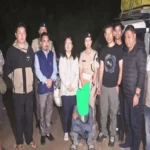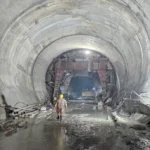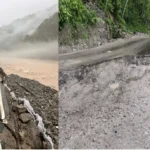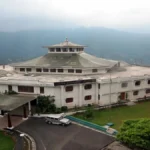GANGTOK: In a dramatic midnight raid, Sikkim Police arrested Suvijan Subba, the alleged mastermind behind 80% of the heroin flowing into the Himalayan state. The 33-year-old, previously arrested six times under the Sikkim Anti-Drugs Act (SADA), was picked up from his hideout in Siliguri’s Gosaipur area at 12:30 AM on Thursday.
Police say Subba ran a well-organised cartel, using a network of couriers to smuggle heroin from West Bengal into Sikkim. His arrest comes just days after three accomplices were nabbed in Jorethang with 815 grams of heroin worth ₹40 lakh. Authorities have also frozen multiple bank accounts linked to the syndicate, dealing a significant blow to the drug trade.
From Small-Time Dealer to Drug Kingpin: The Bust That Shook Sikkim’s Underworld
Subba, a resident of Chisopani in Jorethang, had been living in Siliguri for three years, using the city as a base for his operations. Despite his six prior arrests, he continued to expand his network, supplying heroin to dealers across Sikkim.
“He operated like a cartel,” said Senior Superintendent of Police (SSP) Karma Gyamtso Bhutia at a press conference. “Our intelligence suggests he controlled 80% of the heroin entering Sikkim. With his arrest, we expect a drastic drop in supply.”
Police have identified 20 more peddlers working under Subba, with arrests underway.
The Midnight Raid That Brought Him Down
Acting on a tip-off, a special Sikkim Police team raided Subba’s home in Bagdogra, Siliguri, catching him off guard. Officers seized digital evidence, including phone records and transaction details, which led them to freeze his ill-got funds.
“This wasn’t just about one arrest,” SSP Bhutia said. “We’re dismantling an entire supply chain.”
The operation follows a May 5 drug bust in Jorethang, where police intercepted a truck carrying heroin, Nitrazepam, and Tramadol, leading them straight to Subba.
Why Sikkim Is a Hotspot for Drug Trafficking
Sikkim’s strategic location, bordering Nepal, Bhutan, and China, makes it a prime route for drug smuggling. Traffickers exploit porous borders, using small towns like Jorethang and Siliguri as transit points.
The state has seen a rise in addiction, particularly among the youth, prompting police to launch strict enforcement drives. The Sikkim Anti-Drugs Act (SADA) and Narcotic Drugs and Psychotropic Substances (NDPS) Act allow for harsher penalties, but traffickers keep adapting.
What Happens Next?
With Subba behind bars, police are now targeting his remaining network. Authorities believe his arrest will cut the heroin supply by 80%, but admit the fight is far from over.
“We’re committed to wiping out this menace,” SSP Bhutia vowed. “Public cooperation is key—if you see something, report it.”
Sikkim Police have urged citizens to use hotlines and online portals to share tips anonymously.
Final Word: A Step Forward, But the War Continues
Subba’s arrest marks a significant victory, but experts warn that drug syndicates will regroup. For now, Sikkim can breathe easier, knowing one of its biggest narcotics threats is finally off the streets.










